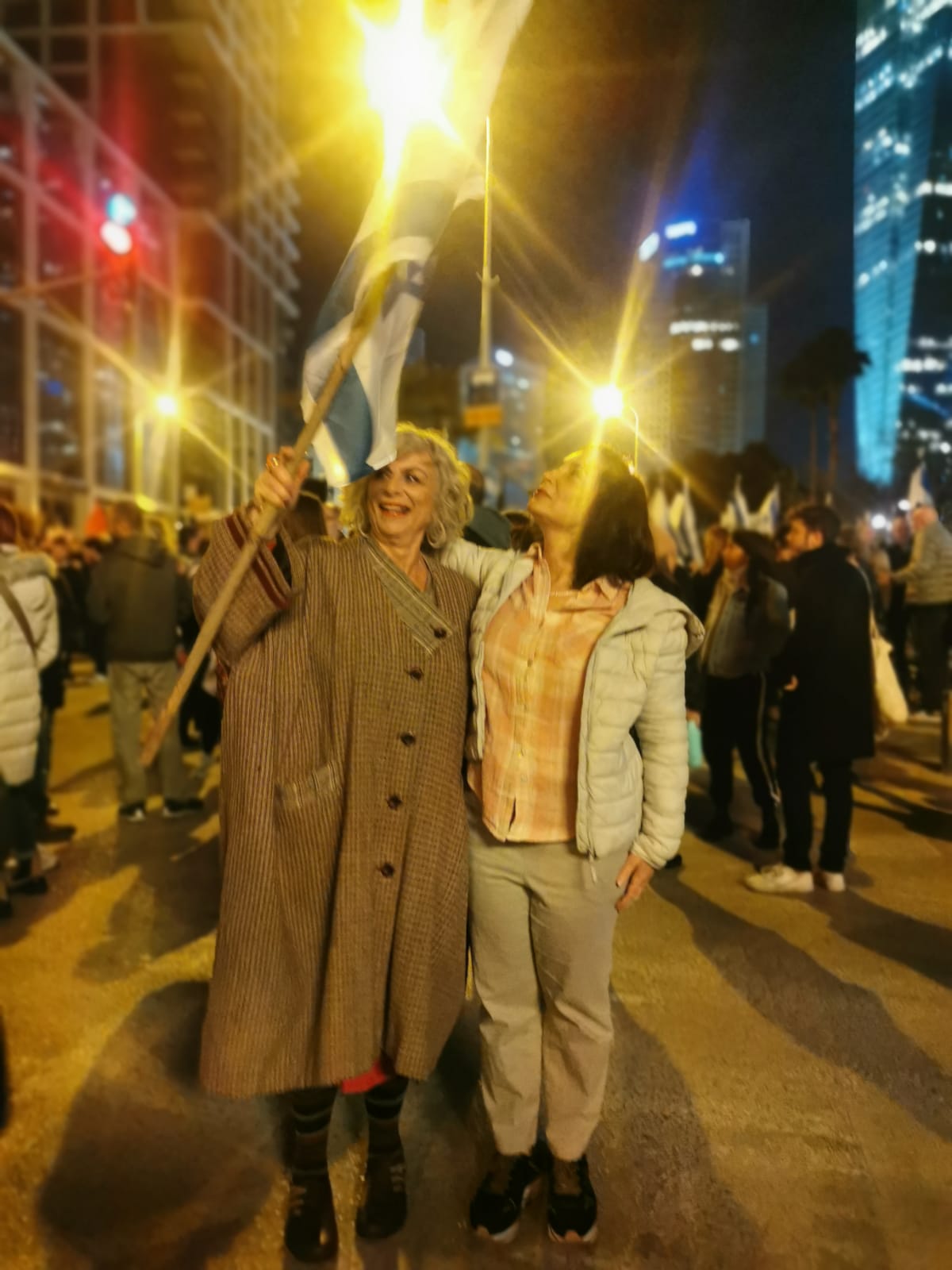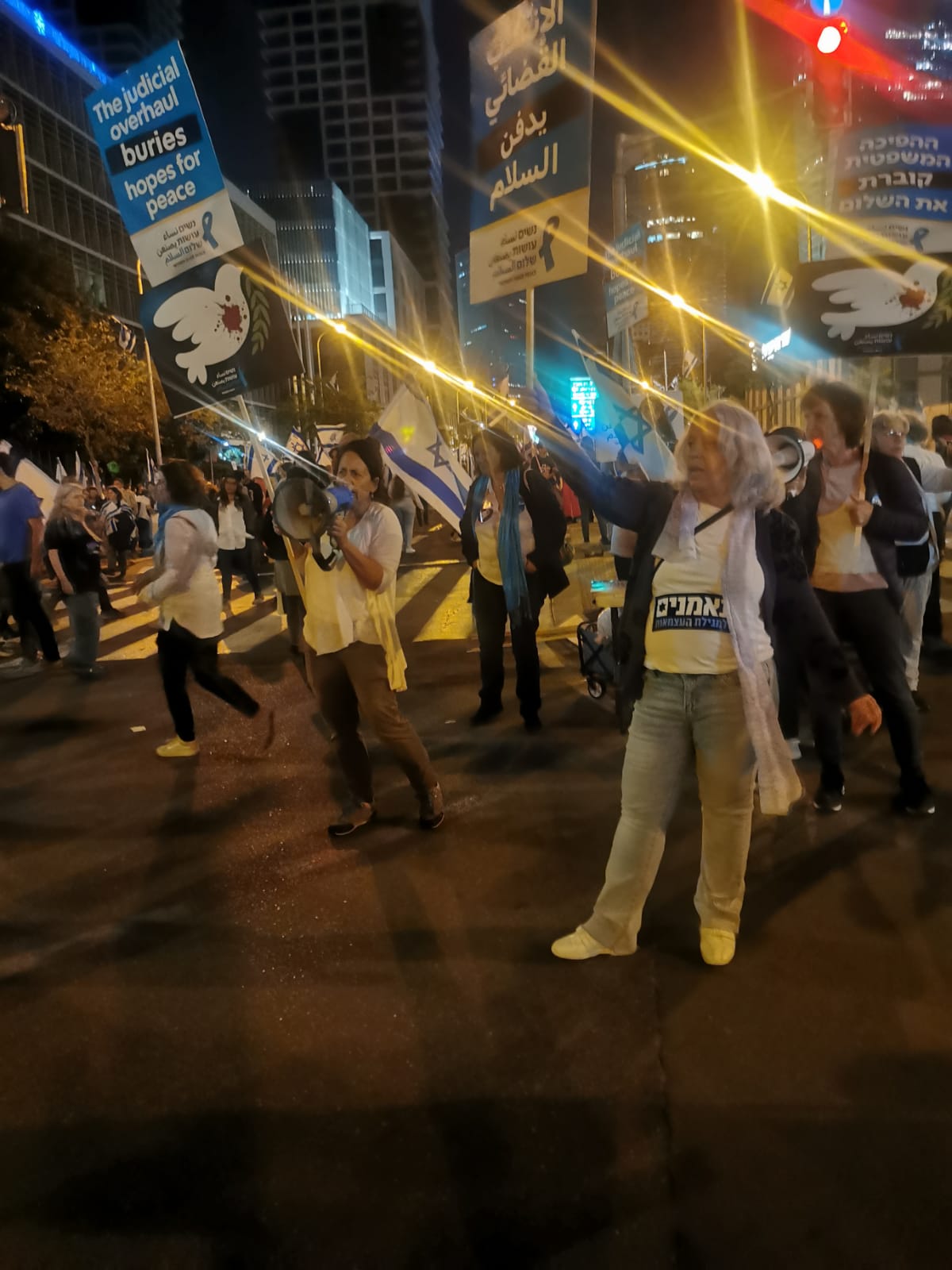Manuela Dviri is an Italian-Israeli writer, journalist and activist. After the loss of her son in the first Israel-Lebanon war, she joined the “Four Mothers” campaign, whose contribution led to the retreat of the Tel Aviv army in 2000. Among her writings War in the Eyes. Diary from Tel Aviv (2003), the play that later became a book, Life in the Land of Milk and Honey (2004), A World Without Us (2017). She has written for Haaretz, The Guardian, Corriere della Sera.
Saturday evening, June 3, 2023. A Saturday like any other. The twenty-second week of protests on Kaplan Street, Tel Aviv, and in the whole of Israel. 140,000 on Kaplan Street alone, the media say. Half a million across the whole of Israel. Out of a population of less than ten million souls. These days we go back to our homes with flags under our arms, tightly wrapped so they don’t fly into our faces. On foot, by bike, by electric scooter. Normal people, the young, the elderly, children.
This demonstration in Tel Aviv had begun with a minute of silence to commemorate the three nineteen-year-old soldiers killed in the night by an Egyptian soldier. Two men and a woman. Saturday evening demonstrations form only a part of the protest. Protesters also follow coalition members wherever they go, from Bibi all the way down, with trumpets and drums and megaphones, chanting busha: “Shame”.
Abroad, too. In March, they followed Benjamin Netanyahu to Rome, Berlin and London, where he met with other heads of state, and local Israelis demostrated in each of these cities. So far, Biden has not wanted to host him. In New York, a group of Israelis equipped with trumpets and megaphones followed one of the fathers of the reform, Simcha Rothman, who was in the city for a conference, until, unnerved, he wrestled a megaphone off a young woman’s neck.
How did we get here?

It all began in November, after Netanyahu’s victory and the formation of a new government through a coalition of six parties: Likud, the ultra-religious Haredi parties, and the Religious Zionist Party. It was December 29. At a press conference held on January 4, Minister of Justice Yariv Levin announced the government’s plan to reduce the judiciary’s independence, a reform that would empower the executive branch to override the judiciary one.
“It’s a coup, a regime change, the beginning of a democratic dictatorship”: such was the immediate response of, among others, retired Supreme Court Justice Elyakim Rubinstein in a letter signed by almost all prosecutors and attorneys who have held roles in the last fifty years. In order to understand the gravity of the situation, it is worth recalling that Israel lacks a Constitution, nor does it have a Senate. And that the President’s power is merely symbolic. Meaning that the judiciary provides the sole check to the executive. The thought alone evokes anxiety and fear so strong it can keep you awake at night. An end-of-the-world feeling. And a feeling of shame.
I remember that the first demonstration took place under torrential rain. It was January 14. There were no more than 80,000 of us, under our umbrellas. All of us relatively old. But things would soon change.
One of the more creative demonstrations was the one held in Jerusalem on March 16. During the night, dozens of artists disguised as municipal workers painted a red and pink stripe all along the street leading to the Supreme Court, to convey the inseparability between an independent judiciary and freedom of creation and expression, of leisure, culture and sport.
“History shows that the destruction of democratic institutions inevitably leads to persecution, silencing and censorship of art, culture and creativity”, the organizers declared. “There is no culture, creativity, and free thought without democracy and there is no democracy without culture, […] there are no colors, no shades, only a gray and oppressive mask whose purpose is to produce an obedient and fearful society.”.
The most important protest, the most unforgettable, was the one held on March 26. That day, Netanyahu announced his plan to dismiss Minister of Defense Yoav Gallant, guilty of holding a press conference to ask for the reform to be paused on the grounds that it might create divisions in the military. Mere minutes after hearing the news of the minister’s planned removal, hundreds of thousands of demonstrators, most of them young, some very young, poured onto the country’s streets, and they went on to protest until late at night, furiously demanding that the minister keep his position. Meanwhile, the universities announced a strike, and over twenty local authority chiefs declared hunger strikes.
The following day, March 27, the workers’ union announced a general strike. The Stock Market closed. Israeli embassies abroad closed. Flights were suspended, in a country you can only leave by plane. Schools and universities were at a standstill. Chaos reigned.
Netanyahu understood. After a day of negotiations, the Prime Minister told the nation that the contested reform would be postponed, or rather, that it would be paused. At the same time, President Isaac Herzog took on the role of moderator in a new dialogue between the coalition and its opposition. And the Minister of Defense was not fired after all.
The protest’s organizers replied that they would stop only when the reform was fully, totally and absolutely shelved.
So the protests and demonstrations continued. Their sole interruption was on May 13, during Operation Shield and Arrow, due to the risk posed by missiles from Gaza. But even on that day, many continued to protest, especially in Tel Aviv. It’s hard to deny our new Saturday evening appointment, our best anti-depressant.
There have been greater and smaller victories, and greater and smaller defeats. One thing is certain: in order to preserve his “reign”, Netanyahu needs a country that is divided, pessimistic, desperate and depressed. He wants us poorer, less connected, more scared and disoriented, or, even worse, indifferent and apathetic.
The protest is the opposite of all this. It is cheerful, optimistic, creative, open to all. There is no violence and no danger for those who join. No one here is under cover. There are no acts of vandalism. There is life, and creativity. There is a voice that demands to be heard.
In 1998, after my son Yoni died during the eternal war against Lebanon, when I found the strength to fight for the retreat of the Israeli army from the Land of Cedars and for its return to national boundaries (which happened in May 2000), I learned a great lesson. I learned that my voice mattered.
This pause on the reform confirms it. Every voice counts. All our voices count. The protest, like a body, inhales and exhales, tenses and relaxes, experiences moments of activity and ones of reflection. With the summer heat (and it really does get hot here in the summer), with the holidays, with the departure of many Israelis for trips abroad, and above all with the Knesset’s recess on July 30, our numbers will shrink significantly.
But the road leading to July 30 remains long. As soon as a new danger appears, the ranks of the protest’s auxiliary troops will fill once more. It is essential to remain vigilant, in control, ready to employ our energy. The protesters will return, generals and former heads of state, doctors and psychologists, teachers and former diplomats, tech experts and AI experts, innovators and economists, start-up founders, writers and journalists and students, Israeli Arabs, LGBTQIA+ activists, those “against the occupation”, the pink flags and the black ones specifically against Bibi.
Each with their own physical corner, their own specific group to which they belong within the bigger group. The young will continue to chant Nafaltem al-hador ha-lo nachon, “you’re messing with the wrong generation”, and “De-mo-cra-cy”. All will return. Many will return. I hope.
Cover photo: Demonstrators march past a billboard depicting Israeli Prime Minister Benjamin Netanyahu during a rally protesting his government’s judicial overhaul bill in Tel Aviv on June 10, 2023 (photo by Jack Guez/AFP.) All the other pictures’ credits belong to Manuela Dviri.
Follow us on Facebook, Twitter and LinkedIn to see and interact with our latest contents.
If you like our analyses, events, publications and dossiers, sign up for our newsletter (twice a month) and consider supporting our work.



